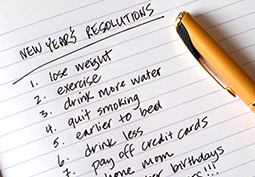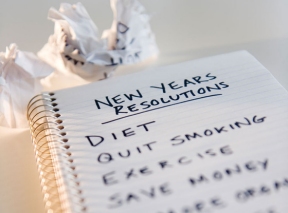
By Sylvia Melendez-Klinger, RD
It is that time of the year when we start worrying more about our health and wellbeing, especially about those extra pounds that we’ve been wanting to lose. Come the first day of the year and we start with mighty force. We might have learned about someone else losing weight or read yet another article inspiring us to make a resolutions list that really motivates us. Well, you will be surprised to find out how many people fall off the wagon just by the end of the first week in January! But this New Year can be different. As a registered dietitian, founder of Hispanic Food Communications Inc. and consultant for The Coca-Cola Company, I want to share a few of the best secrets for embracing life changing habits for good:
1. Set a realistic weight-loss goal. Most experts recommend aiming for half a pound to 2 pounds a week. This way your weight loss will be safe and steady, which will lead to a long-term weight loss success. Keeping track of your food intake for a couple weeks will help you visualize what you are consuming against your needs – a good eye opener. My favorite app for tracking my food intake is My Fitness Pal.
2. Spice your diet with exercise. As you gradually reduce the number of calories consumed try to make sure that you provide your body with high quality nutrients, combined with fun regular exercises for a safe and steady weight loss. It is important to combine both.
3. One step at a time. Don’t be disappointed if you cave in an indulgent treat – it doesn’t mean you’re a failure. Eliminating your favorites from your diet may result in binging. Therefore, you don’t have to eliminate your favorite treats from your diet, just remember to eat in moderation. For example, chocolate lovers can eat one to two small pieces of chocolate and soda lovers can grab a 90-calorie mini can. It’s about being conscious about controlling your portions.
4. Regular eating plans. Eat at least three meals a day in a calm and relaxed ambiance. It’s very important to savor your foods, and concentrate on the taste, flavor and texture. And remember to chew every bite at least 15 times! It will help you to slow down, have better digestion and enjoy your meal.
5. Get organize. Plan your meals and prepare your shopping list ahead of time. Make sure your list includes a significant amount of high quality ingredients that incorporate a variety of nutrients to meet your body needs.

6. Love your veggies. Vegetables, are low in fat but contain good amounts of vitamins and minerals and they are home for many antioxidants that help protect the human body from chronic diseases and boost the immune system. Eat at least 2 to 3 cups of fresh seasonal vegetables every day – seasonal vegetables have more flavor and are less expensive. Make sure you choose different vegetables for added nutrients. For example, yellow and orange vegetables are rich in Vitamin A and βeta carotene. Dark-green vegetables are a very good source of minerals, flavonoids as well as powerful antioxidants.
7. High fiber foods still rule. A recent study of the American Journal of Nutrition has shown that a high fiber diet, can prevent weight gain. Foods that are rich in fiber take longer to digest, giving you a longer feeling of satiety.
8. Rediscover your passion for cooking. Have you ever noticed how everyone always seems to gather in the kitchen when you have a get-together? It’s something magical. People love being together. Cooking can give you the peace of mind, knowing that what you have prepared your meal with fresh and delicious ingredients. And it’s a great excuse to invite friends and family to get together at the table!
9. Keep track of your weight loss. Nothing can be more satisfying than stepping on a scale and seeing those numbers decline. The best thing you can do is to weigh yourself once a week at the same time each time. Most people prefer to weigh in the morning when they first get up. Whatever time works for you, be consistent with it. Also, it’s a good idea to take your measurements when you start a weight-loss program and then track your inches at the same time you track your weight. The key areas to measure are your bust/chest, waist (above the hips), and hips.
10. Stay hydrated. How much water should you drink each day? There are multiple studies that have been done over the years, but your water intake depends on many factors, including your health, how active you are and where you live. An adequate intake for men is roughly 3 liters (about 13 cups) of total beverages a day, and for women it is 2.2 liters (about 9 cups) of total beverages a day.
Now you have 10 useful tips to help you start the year on track that will stick long enough to make it a routine.











